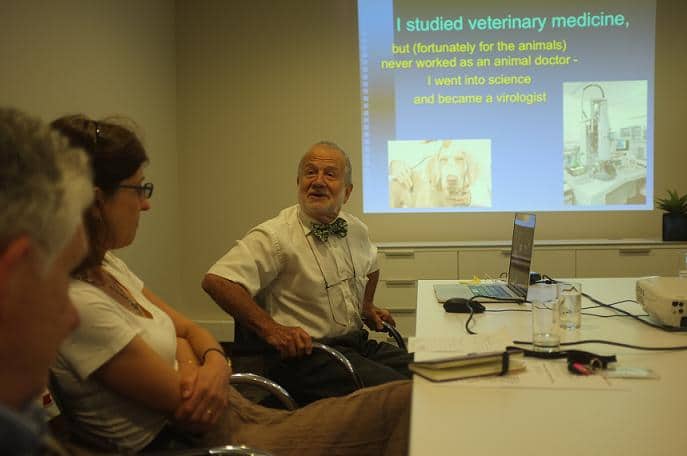
Marian Horzinek giving a STIAS Fellows’ seminar in 2014
PRESS RELEASE by African Small Companion Animal Network (AFSCAN) Initiative supported by Zoetis
Leading Veterinarian to Support AFSCAN Rabies Control Work in Project for the Stellenbosch Institute for Advanced Study
One of the world’s most distinguished veterinarians, Professor Emeritus Marian Horzinek, is to support the work of the African Small Companion Animal Network (AFSCAN) in rabies control as part of a project he is undertaking as a Fellow of the Stellenbosch Institute for Advanced Study (STIAS). He has also highlighted to STIAS the importance of involving veterinarians at a high level in human health projects, including those involved with rabies control.
Dr Horzinek has a distinguished career in rabies research and founded the Vaccination Guidelines Group of the World Small Animal Veterinary Association (WSAVA). He was made a Fellow of STIAS in 2014 – the first veterinarian to receive this honour. STIAS aims to nurture and encourage leading scholars and researchers to find innovative and sustainable solutions to global issues and, in particular, those affecting Africa. It was established in 2000 and is based in the Stellenbosch region of South Africa.
AFSCAN is an initiative run by the WSAVA’s charitable Foundation to advance standards of veterinary care across Africa and to support the fight against rabies. It runs regular rabies control projects in partnership with Mission Rabies and its sister charity World Veterinary Services (WVS).
Fellows of STIAS are funded to undertake projects which support a range of themes relating to development in Africa. Dr Horzinek’s project will support the theme Health in transition. Commenting, he said: “Almost all human deaths from rabies occur in Asia and Africa with an estimated 55,000 fatalities annually worldwide. In South Africa, between 10 and 30 cases of human rabies are confirmed every year. Dogs are the main vector but other species also play a role in its continuation. There is already a range of rabies-prevention initiatives in place so my objective for STIAS is to research the situation in Africa, liaising with those already involved in rabies control; assessing the need for further study and addressing the conditions required to achieve regional elimination or even global eradication. Through my project, I look forward to demonstrating the vital contribution of veterinary science in facilitating a true One Health approach.”
He continued: “The AFSCAN project is already making great progress so I intend to assist its training and educational programmes, as well as supporting veterinary research projects in companion animals and wildlife in partnership with the Onderstepoort University of Pretoria Faculty of Veterinary Science.”
Dr Gabriel Varga, Chairman of the AFSCAN Board and Director of Business Operations for Zoetis North Europe region, said: “AFSCAN has ambitious goals to transform the veterinary landscape across Africa and to make strides in controlling dangerous but preventable diseases, such as rabies. We are privileged that Dr Horzinek plans to support our work as part of his next STIAS project. His experience and understanding of rabies is without parallel and he will undoubtedly be a huge asset to us for the duration of his project.”
Zoetis is AFSCAN’s major supporter but it is also supported by a range of other organisations which, together, form the AFSCAN Consortium.
